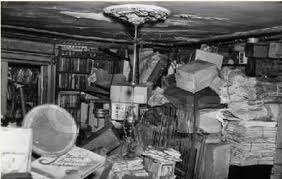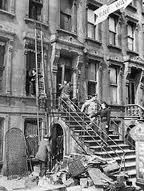 The Collyer brothers, Homer and Langley, were the stuff of urban legend. A couple of eccentrics, they lived in a grand Fifth Avenue brownstone left to them by their parents who died when the boys were young adults. Langley, wounded by mustard gas in the First Great War, became a classic hoarder of junk from the streets of Manhattan. Homer had lost his sight but knew his way around the clutter-filled halls, corridors and stairways of the family manse.
The Collyer brothers, Homer and Langley, were the stuff of urban legend. A couple of eccentrics, they lived in a grand Fifth Avenue brownstone left to them by their parents who died when the boys were young adults. Langley, wounded by mustard gas in the First Great War, became a classic hoarder of junk from the streets of Manhattan. Homer had lost his sight but knew his way around the clutter-filled halls, corridors and stairways of the family manse.
Suspicious of authority and fearful of intruders, the brothers grew increasingly reclusive as they grew older. They boarded up the windows and stopped paying their taxes and utility bills. The real-life brothers died within days of each other in 1947: Langley first, then Homer some days later because he had relied upon his brother for sustenance and was helpless without him. Notified of a foul odour, the authorities broke down the door and found Homer’s body. Only after removing tons of junk from the house, a labour that took more than week, did they stumble upon Langley’s corpse just ten feet away.
Onto this historic foundation, American writer E. L. Doctorow has built a strange novelistic edifice, Homer & Langley, that seems to be crumbling at the cornices just like the declining mansion in which its eponymous central characters reside like inmates in an asylum. It is, in the early years, a place where music and laughter resound and weekly tea-dances are held as a public service. In Doctorow’s reworking of the Collyer legend — ably narrated by the blind Homer — the brothers have servants, romantic affairs, and social interests beyond their homestead, and they outlive their real-life counterparts by about half a century, enduring through the hippie era into at least the 1990s.
Langley’s lifelong project is to compile a universal newspaper containing a distillation of all news that ever happened: he keeps files of newspaper stories, categorized by type of event. According to his eccentric “theory of replacement,” all occurrences and all people are merely recurrences of previous events and personages. Yet he cannot find an equivalent for certain events such as the Jonestown mass-suicide or for certain people such as the brothers themselves, whom he regards as “sui generis.” They go into his file of unique items awaiting a repetition.
 Langley fills the house with multiple sets of daily newspapers and the detritus of his various hobbies and enthusiasms: old bicycles and typewriters and assorted parts for same, medical specimens preserved in alcohol, a Model-T Ford parked in the main hall —
Langley fills the house with multiple sets of daily newspapers and the detritus of his various hobbies and enthusiasms: old bicycles and typewriters and assorted parts for same, medical specimens preserved in alcohol, a Model-T Ford parked in the main hall —
the motor of which is used to generate electricity after the electric company turns off the power. (When the city disconnects the water, the brothers haul water from a nearby park.) Readers familiar with Doctorow’s acclaimed other novels — including The Book of Daniel, Billy Bathgate, World’s Fair and Ragtime — will find much familiar “Doctorow” detritus in the new book as well.
Like beloved items found in an “old curiousity shop,” one encounters in Homer & Langley a lively speakeasy, jazz music and musicians, an old-fashioned police raid, Chicago-style gangsters, and a lovely Japanese-American couple whose position as loyal servants to the Collyers cannot prevent their internment after Pearl Harbour. Doctorow’s reverence for New York and its history is also reflected in these pages, as is his perpetual sense of disillusionment with the American dream. Those astonishing combustible moments of character and incident for which he is famous are also present, although much fewer in number.
It is, of course, something of a tour de force to have a blind narrator tell a tale so credibly and vividly; that he is also going deaf in his later years only adds to the achievement. But Doctorow has always been a master of narrative voice. What is newer for him is the focus on that lateral stage of life that Shakespeare described as “second childishness and mere oblivion, sans teeth, sans eyes, sans taste, sans everything.”
The Collyer mansion was not just a home to the brothers but “a road on which Langley and I were traveling like pilgrims,” Homer notes about midway through his tale. The novel itself must also represent a spiritual meditation, a sort of memento mori for Doctorow himself as he approaches the age of 80.
 Its central conflict seems to be the brothers’ attempt to integrate into the world around them, and their ultimate failure as they withdraw ever more fully and permanently into the home that eventually becomes their tomb. What begins as a Dickensian frolic ends up more like a gothic nightmare from Poe. This is a story of decline and decomposition, of the loss of the light, of two brothers sinking so deeply into the morass of their own eccentricity that they are transformed into mythic figures, the stuff of legend.
Its central conflict seems to be the brothers’ attempt to integrate into the world around them, and their ultimate failure as they withdraw ever more fully and permanently into the home that eventually becomes their tomb. What begins as a Dickensian frolic ends up more like a gothic nightmare from Poe. This is a story of decline and decomposition, of the loss of the light, of two brothers sinking so deeply into the morass of their own eccentricity that they are transformed into mythic figures, the stuff of legend.
Homer & Langley is 208 pages long and is published in hardcover by Random House.
* * *






